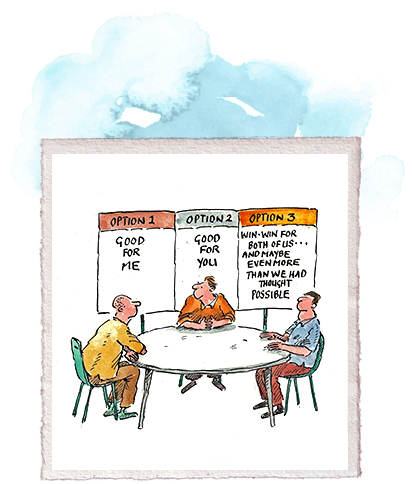



MEDIATION
This is an information document for those persons involved in a dispute who
are looking for a more positive way than litigation to resolve their differences.
MEDIATION IS A WIN-WIN PROCESS
Mediation is a consensual and amicable dispute resolution process.
It is a highly cost-effective process compared to litigation and can save a lot of
money, time, heartache and bad feelings. It is particularly effective if there needs
to be ongoing contact or relationship between the sparring partners. It provides
a safe space for dealing with the emotions in the situation and gives each party
a sense of being understood and really heard – often for the first time in a long
and arduous battle.
The mediation process has a satisfactory outcome for both parties as goal.
As opposed to litigation, which is rights-based, mediation is an interest-based
process. Mediation focuses on relationships, communication and understanding.
In many cases it improves or transforms relationships. Mediation is a win-win
process and can bring surprisingly beneficial outcomes that are not possible
in litigation.
Good mediators enable parties to come to agreements based on information and understanding of each other’s positions and needs. When feelings, interests and needs are met, people tend to be more satisfied with the overall outcome of the process.
During mediation the mediator is merely a facilitator.
The mediator is not a judge or decision-maker, does not give advice and does not declare who is right and who is wrong. Unlike in court, during mediation the parties are in control of the process. They talk through the difficulties until a mutually satisfying, and often better than expected, solution can be tailored and agreed upon.
The parties themselves influence the decisions, rather than the parties’ attorneys.
During the mediation, the mediator regulates the proceedings, although the parties remain in control of the content and outcomes. The mediator can meet with both parties and their representatives together or separately and may continue to have such meetings until the parties are ready to come to an agreement. It is essential that the mediator should be professional and impartial, and should be seen to be so. If not,the whole process can collapse through a perception of bias towards one of the parties (good or bad).
The most important characteristics of a typical mediation process are:
- Promotion of access to affordable justice and particularly restorative justice
- Confidentiality
- Flexibility, informality and creativity to provide solutions that are beyond the scope and powers of court-based processes
- Speediness and cost-effectiveness
- Restoration of relationships
Furthermore:
- The process is voluntary and consensus-based
- Parties remain in control of the content and ultimate outcome
- Facts and opinions disclosed in mediation are without prejudice and off the record
- Mediation provides the opportunity to avoid litigation or to narrow issues in dispute for litigation
How to decide whether to mediate or not?
- All matters of civil dispute that would otherwise end up in litigation should be considered;
- Either party may invite the other party to mediation;
- Mediation is beneficial particularly where future relationships, speed of resolution and confidentiality are important factors;
- Where parties need to vent emotions;
- Where an adverse precedent will be a problem for both sides;
- Where both sides believe they have a good cause but do not want to litigate or want to retain control of the outcome and have relatively equal power in the situation;
- Where the case has a great likelihood of being settled out of court anyway, or where complex technical issues are at stake; or
- If the opposing party is unwilling, summons may be issued for civil litigation, followed by an offer to submit to mediation in order to avoid litigation.
Important elements to be covered by an agreement to mediate
i. Personal details - Who the parties are as well as their physical and electronic contact details;
ii. Date, time and venue of the mediation;
iii. The precise nature of the issue or issues to be mediated;
iv. An agreement to mediate, with a reminder that it is a voluntary process;
v. The name of the mediator and his/her role;
vi. Time allocated to mediation and conduct during mediation;
vii. Authority to negotiate and decide;
viii. Confidentiality and privilege of the content
(the mediation is without prejudice and off the record, and may not be used outside the mediation process);
ix. Costs, fees and how they will be contributed by the parties;
x. Consequences of not adhering to the mediation agreement;
xi. The contract is only binding upon signing and on the parties to the mediation;
xii. Procedure and consequences if mediation fails;and
xiii. Procedure if mediation succeeds.
Further comment
- All parties need to be willing, able and of sound mental capacity.
- The settlement agreement should accurately reflect the above elements, as well as any other relevant aspects, should be legal and may not include any criminal aspects or intentions.
INFORMATION TO BE USED AT YOUR OWN RISK.
Any suggestions or opinions voiced in these pages are those of the authors, and in no way to be constructed as final treatment advice. They are intended as a starting point to develop your own preparation and treatment plan. Please consult your medical and/or psychological experts or caregivers to fine-tune the advice and suggestions for your own unique needs.

